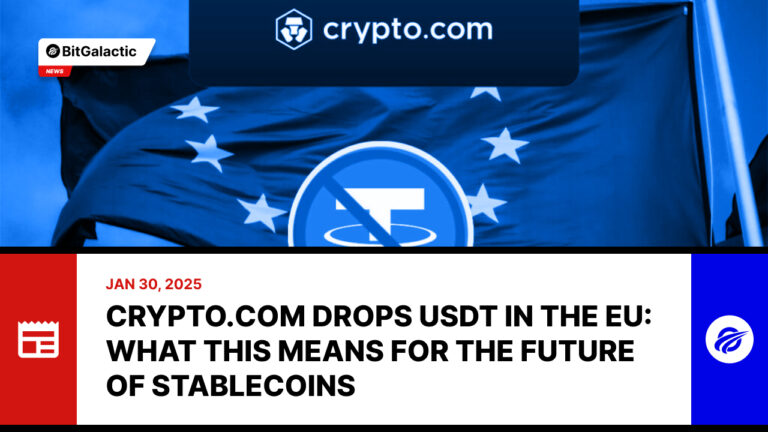Crypto.com Drops USDT in the EU: What This Means for the Future of Stablecoins.
Crypto.com, one of the world’s largest cryptocurrency exchanges, has announced its decision to delist Tether’s USDT in the European Union (EU) as part of its compliance with the Markets in Crypto Assets Regulation (MiCA). Along with USDT, nine other digital assets will also be removed from the platform.
Why is USDT Being Delisted?
MiCA, which came into effect in June, mandates that stablecoin issuers within the 27-nation bloc must register as electronic money institutions. Since Tether has not obtained this license, its flagship stablecoin, USDT, is no longer deemed compliant. As a result, exchanges operating in the EU, including Crypto.com, are required to remove it from their platforms.
A spokesperson from Crypto.com confirmed that purchasing affected assets will be suspended on January 31, and users have until March 31 to convert their holdings into compliant alternatives. Any remaining balances after this deadline will be automatically swapped into a MiCA-compliant asset of equivalent market value.
BitGalactic’s Perspective: A Regulatory Power Play?
While compliance is necessary, the move raises questions about regulatory control over crypto markets. BitGalactic analysts argue that MiCA’s strict framework may push some crypto businesses away from the EU rather than fostering innovation. Tether’s USDT remains the dominant stablecoin globally, with a staggering $139 billion in circulation—far surpassing Circle’s USDC at $52 billion. By restricting access to USDT, the EU risks creating a fragmented stablecoin market where traders and investors face liquidity challenges.
The Bigger Picture: More Assets on the Chopping Block
Tether’s USDT is not the only casualty of MiCA enforcement. Crypto.com is also set to delist Wrapped Bitcoin (wBTC), PayPal USD, DAI, and several staked versions of Ether and Solana. In a similar move, Coinbase Europe had already delisted USDT and wBTC in December.
Adding to the controversy, legal battles surrounding wBTC have intensified. BitGo, the issuer of Wrapped Bitcoin, accused Coinbase of abusing market power by favoring its own wrapped Bitcoin product. This lawsuit, filed in a San Francisco federal court, highlights ongoing tensions between regulatory compliance and competitive market dynamics.
What’s Next for Crypto in the EU?
With regulators tightening their grip, the crypto landscape in Europe is shifting rapidly. While MiCA aims to bring clarity and consumer protection, its impact on liquidity, innovation, and market access remains uncertain. Will new regulations encourage the development of EU-compliant stablecoins, or will they push traders to offshore exchanges? BitGalactic will continue to monitor the situation closely.
For EU-based traders, the message is clear: stay informed, adapt to regulatory changes, and explore compliant alternatives before the deadline hits.
Share this post


